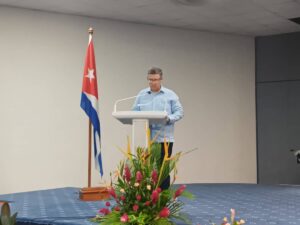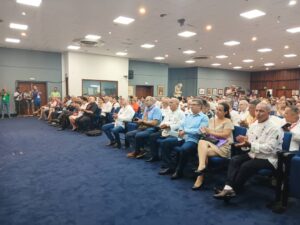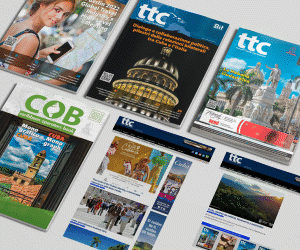History and culture in Cuban cuisine, Varadero Gourmet 2023’s central theme

Flavors and aromas also mark the identity and culture of peoples. Dr. Félix Julio Alfonso has expressed it with other words at the inaugural lecture of the 13th edition of the Varadero Gourmet International Festival. On the relationship between history and food in Cuba in the centuries marked by the Spanish colony, the historian wove a presentation that began with references from the late 15th century, when the Europeans’ contact with the indigenous population occurred, until the end of the 19th century, with Cuba’s struggles for the independence.
“I have taken these dates, because there is consensus in that it was during this period that important eating habits were configured, which have defined our way of consuming and appreciating various agricultural, livestock and fishing products,” he argued.

Dr.C Félix Julio Alfonso. Foto: DPG/TTC
Phenomena of so much transcendence as the almost total extinction of the indigenous people, their replacement with the African forced slavery or Spanish immigration and other European and Asian nations, left a deep mark on the imaginary of Cubans’ meals and beverages, the professor reflected. “In this sense, it is a common place to affirm that Cuba’s food is not indigenous, neither Spanish, nor African or Asian, but the result of continuous transculturation, of multiple ethnohistoric influences and successive additions and sedimentation. Its condition of intangible cultural heritage of the Cuban nation, exalts a secular tradition transmitted throughout generations.”
Dr. Alfonso mentioned the cuisines that have been recognized as a World Heritage for their cultural value. Such is the case of French cuisine, of the Great Mediterranean region, of Japan, Mexico, Peru, China or Spain.
“Food is a deep expression of identity and a transmitter of culture; it is a very effective way to safeguard and preserve the cultural identity of a society. I would dare to affirm that it is also an ideological component, understanding here by ideology the way people live their daily lives.”

For his part, Jorge Luis Acosta Paula, president of the Organizing Committee and General Director of the Palmares non-hotel company, highlighted the importance of the gastronomic cultural wealth of the Caribbean nation and the need for transferring knowledge to the new generations.
Cuban Deputy Minister of Tourism Adalberto Venero Lemus also expressed the need for events of this type to enhance the development of the tourism sector, of vital importance for the recovery of the Cuban economy.
The central theme of this edition of the Varadero Gourmet International Festival, which was held in Plaza América until September 23, is the “safeguard of Cuban food” due to the country’s interest in protecting and perpetuating traditional Cuban cuisine as an identity trait of the nation.
In the closing ceremony, Deputy Minister of Tourism Adalberto Venero Lemus urged the participants in the event to make “every day a festival like this,” in order to satisfy the client. He also recognized the workers who day by day highten the prestige of Cuban cuisine.

After three days of competition and an intense jury work, the awards were given in the categories of best starter, best main course, best dessert, best pairing, best service, best stand and best animation team.
Among the winners were especially the Palmares non-hotel company, the Cubanacán Hotel Group, Gran Caribe, Islazul and Melia Hotels International. While the best stand went to Cubaron with an elegant proposal and in tune with the theme of the contest.

MORE NEWS










